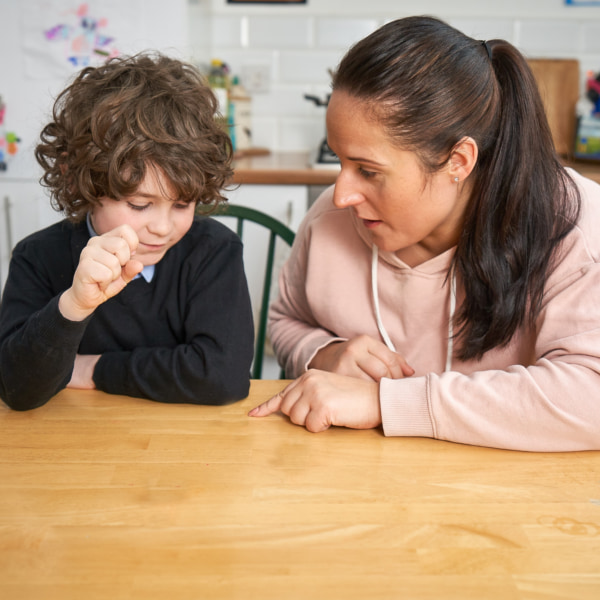We all need to take care of our mental health. And one of the ways we can help stay in good mental health is to be aware of how we feel and talk about it to someone we trust. This goes for all for us – parents as well as kids! Here we look at how you can talk to your child about their mental health, and about your own mental health as well.
Why it's good to talk about mental health
We don’t all feel comfortable talking about our feelings. Some people are embarrassed to express how they feel, while others believe feelings should be kept private. But the more we talk about how we feel, the easier it becomes, and the less likely we are to bottle things up and let problems get us down.
If your child is used to talking to you about how they feel, it’ll make it easier for them to come to you if they feel upset, down or anxious – and it’ll help them become more understanding and accepting of other people’s feelings too, making it easier for you to talk to them about your own mental health.
Tips for talking to your child about their mental health
Tip #1: Talk little and often
It’s a good idea to make talking with your child about feelings a regular thing. You don’t always have to talk about how they’re feeling – you could talk about how characters are feeling in their favourite books or TV shows. This will help make talking about feelings and mental health a natural part of everyday life.
Tip #2: Create a relaxed atmosphere by doing an activity together

Sometimes it’s easier to talk while you’re doing something else, so it may help to do an activity together that you both enjoy, like baking, drawing, walking or just watching a boxset. The YoungMinds website has some good ideas for activities you could try, as well as conversation starters and tips for supporting your child.
Tip #3: Help them express themselves
Depending on their age, your child may find it hard to explain how they feel. You could try some simple exercises together, like using an 'emotions wheel' or even looking at the emojis on your phone and discussing what each one is feeling.
Tip #4: Talk about ‘big’ and ‘little’ feelings
You could explain to your child that it’s okay to feel upset, angry, fed up, low or scared from time to time. These are normal feelings everyone has. But if these feelings don’t go away, they can build up inside and make us unhappy. Let them know that if their feelings get too big for them to manage or don’t go away, they should talk to you, or someone else they trust, like a grandparent, aunt or uncle, a teacher or a friend.
You could compare it to physical health – if they scrape their knee, it’s natural for it to feel sore for a wee while. But if it carries on feeling sore for a long time, they should tell someone and maybe go and see the doctor.
Tip #5: Listen to what they have to say

With so much going on in our daily lives, focusing your full attention on one thing can be hard. But it’ll really help them open up if you can listen to what they have to say without interrupting or getting side-tracked. Our page on encouraging your child to confide in you has more tips for talking and listening that may help.
Again, it can help to think of it in the same way as physical injury: if they scraped their knee you would stop what you were doing to clean the wound, put a plaster on it and give them a hug. So if their feelings are hurting, take time to listen to them and reassure them.
Tip #6: Watch this video together
This animation from the Anna Freud Centre helps children understand what mental health is and the difference between every day small feelings and a big feeling. It also helps them understand how to be a good listener. You could try watching it together and having a chat about it. You can also download a booklet from the Anna Freud Centre with more advice.
Tip #7: Take care of your mental health together
Squeezing some little things into your daily routine to boost your family’s mental health can make a big difference. This could be going for a walk and getting some fresh air, playing together or doing some calming breathing exercises. This calendar suggests some daily 5 minute mindful activities you could try together. This self-care kit from the NHS also has lots of nice ideas.
Tip #8: Create a ‘zen zone’

If you can, create a space in your home where you and your child can be calm and peaceful. It doesn’t need to be a big space – it could just be a box or a corner behind the sofa. You could keep soothing sensory items there, like a stress ball to squeeze, a fidget spinner or popping toy, a soft blanket or some colouring books and pencils – if you decide together what you’d like to put there this will make it more fun for your child. Most importantly, you could keep other distractions (like your phone) out!
Tip #9: Mind your language
Your child will pick up on the way you talk about mental health and emotions. So if you’re dismissive of mental health issues or use disparaging words like ‘nutcase’ and ‘looney’, you’ll give your child the impression that you don’t care and don’t take mental health issues seriously. This will make them less likely to come to you with any concerns.
What should I do if I’m worried about my child’s mental health?
Even if your child’s insisting that everything is ‘fine’ you may see signs that they’re struggling. Here are some things to look out for:
- They’re more irritable than usual or get angry easily.
- They’re more withdrawn than usual.
- They’re having problem sleeping or are reverting to younger night time behaviours like wetting the bed.
- They seem anxious and cling to you more than usual.
- They have frequent stomach aches or digestive problems.
- They become aggressive and lash out at you.
Of course these signs are just a guide. But as a parent you know your child best, so trust your instincts if you feel something may be wrong.
If you’re concerned, try talking to their teacher and making an appointment with your GP. You can see more tips for supporting your child’s mental health here, and more advice on getting help for your child’s mental health on the YoungMinds website.
Looking after yourself
It’s just as important to look after our mental health as it is to take care of our physical health. But as a parent, maintaining your own wellbeing sometimes gets put at the bottom of the to do list. Our section on wellbeing for parents has lots of advice to help you look after yourself, and information on what to do if you’re struggling. Remember, there’s absolutely no shame in asking for support or help.
Parenting if you have mental health issues
If you are experiencing problems with your mental health, it can be hard for you and for your child. In some cases they may have to take on caring responsibilities, or spend time with other family members or carers while you get better. They may find the situation unsettling or scary, especially if their routines are disrupted, or you get upset or shout at them.
Again, there’s lots of help out there for you. You can find good advice on how to cope with mental health issues as a parent on the Mental Health Foundation and YoungMinds websites.
Tips for talking to your child about your mental health
If you’re struggling with your mental health, you may try to hide this from your child. But depending on their age, they may well pick up that something isn’t quite right and start worrying, so it’s best to be upfront about it. Here are some tips for talking to them about your mental health.
Tip #1: Check in on how you feel

First up, how are you feeling? If you’re feeling a bit fragile or anxious it might be an idea to talk to a friend first and chat through what you’re going to say.
Tip #2: Be open and straightforward
If you or another member of your family are ill (physically or mentally), it can be tempting to try and hide this from your child, to protect them. But children often notice more than we think, and not understanding what’s happening can make them more confused and worried than knowing the facts. So if you or another family member are struggling with your mental health, it’s best to explain this to your child in a straightforward way that’s appropriate for their age.
For example, if your child is very young you could talk about it in the same way as you would a physical illness: that you are poorly and need to take medicine, or have some quiet time or go away for a bit to get better. Or you could talk about ‘little feelings’ and ‘big feelings’ and watch the video from the Anna Freud Centre suggested above.
Let them know it’s okay to talk about it, and they can ask any questions they want to and you’ll do your best to answer them.
Tip #3: Reassure them that it’s not their fault

Mental health issues can sometimes make us act in ways that children can find alarming or upsetting – for example, if we shout, cry or become withdrawn. So it’s important to let your child know that it’s not their fault, it’s because you’re poorly, and you’re doing all you can to get better.
Tip #4: Encourage them to talk about their feelings
Encourage your child to be honest with you about how they feel about the situation, and if anything in particular is worrying or upsetting them. Or you could suggest that they talk to another trusted adult, like an aunt or uncle or their teacher – they may find it easier to talk to someone who isn’t so closely involved.
Tip #5: Try problem solving together

If certain things are worrying them, you could discuss how you can make things better together. If your child feels they have some choice, this will help them feel more in control of the situation.
For example, if an older child often has to look after their younger brothers or sisters a lot, maybe you could involve another family member or friend to help. If they’re upset because their daily life has become unpredictable, maybe you could take steps to introduce more of a stable routine, for example by sticking to regular meal times and bed times and making sure you have time to do things they enjoy.
Further information
There are lots of organisations out there that can help you support your child’s mental health and your own, including:
 Activities & Play
Activities & Play Behaviour
Behaviour Childcare
Childcare Development & Growing Up
Development & Growing Up Family, Friends & Relationships
Family, Friends & Relationships Feeding Your Baby
Feeding Your Baby Food & Eating
Food & Eating Health & Safety
Health & Safety Mental Health & Wellbeing
Mental Health & Wellbeing Money & Work
Money & Work Online Behaviour & Safety
Online Behaviour & Safety Pregnancy & First Days
Pregnancy & First Days School & Education
School & Education Sleep
Sleep








 Behaviour
Behaviour
 Sleep
Sleep